 Petzlover
Petzlover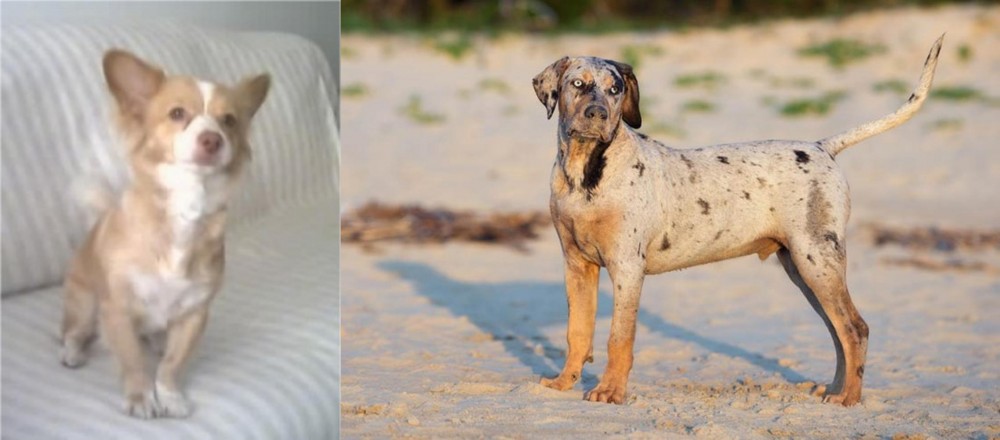 Alopekis is originated from Greece but Catahoula Cur is originated from United States. Alopekis may grow 39 cm / 15 inches shorter than Catahoula Cur. Alopekis may weigh 18 kg / 39 pounds lesser than Catahoula Cur. Both Alopekis and Catahoula Cur has almost same life span. Alopekis may have less litter size than Catahoula Cur. Alopekis requires Moderate Maintenance. But Catahoula Cur requires Low Maintenance
Alopekis is originated from Greece but Catahoula Cur is originated from United States. Alopekis may grow 39 cm / 15 inches shorter than Catahoula Cur. Alopekis may weigh 18 kg / 39 pounds lesser than Catahoula Cur. Both Alopekis and Catahoula Cur has almost same life span. Alopekis may have less litter size than Catahoula Cur. Alopekis requires Moderate Maintenance. But Catahoula Cur requires Low Maintenance
 The courageous Alopekis is said to have run with and fought with bulls. To this day they escort bulls in Greece. They were used by the Greeks to contain the vermin populations, guard the chickens and ducks, and assist larger dogs in working with sheep. At one time it was thought that they originated from breeding of dogs and foxes, but this proved not to be true. It was also once considered to be the same breed as the Small Greek Domestic Dog, but it has since been declared its own breed.
The courageous Alopekis is said to have run with and fought with bulls. To this day they escort bulls in Greece. They were used by the Greeks to contain the vermin populations, guard the chickens and ducks, and assist larger dogs in working with sheep. At one time it was thought that they originated from breeding of dogs and foxes, but this proved not to be true. It was also once considered to be the same breed as the Small Greek Domestic Dog, but it has since been declared its own breed.
The Alopekis is not a recognized breed with any of the current national or international dog organizations. The Kennel Club of Greece will recognize them once their population is large enough. They cannot be recognized by the AKC, IKC, or International groups until they are a much larger group.
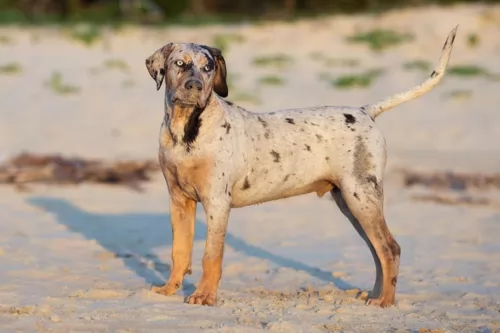 The Catahoula Cur is also known as the Catahoula Leopard Dog or the Louisiana Catahoula. The dog hails from Louisiana, United States.
The Catahoula Cur is also known as the Catahoula Leopard Dog or the Louisiana Catahoula. The dog hails from Louisiana, United States.
It is thought that the Catahoula Cur or Catahoula Hound as it is also known, used to be a hunting dog. The first settlers in Louisiana needed a strong dog to help them with hunting wild hogs and they bred their dogs with other dogs belonging to the locals. This gave them a strong, resilient dog that could take on the wild hogs and also protect their livestock.
Dogs who have no doubt been brought into the mix to produce the Catahoula Cur are mastiffs, Beaucerons, sighthounds and wolves.They are today more commonly referred to as Catahoula Leopard Dogs.
 The Alopekis is a small, fox-like dog with pricked ears on a head that is wedge shaped. They have large eyes, a deep and tapered muzzle with a broad nose. They are short but have long backs and a deep, wide chest with strong legs and feet. They have a beautiful tail that cures upward and a double coat.
The Alopekis is a small, fox-like dog with pricked ears on a head that is wedge shaped. They have large eyes, a deep and tapered muzzle with a broad nose. They are short but have long backs and a deep, wide chest with strong legs and feet. They have a beautiful tail that cures upward and a double coat.
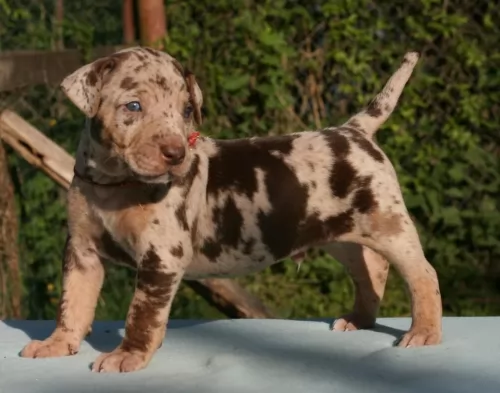 There are varying sizes for Catahoulas and a typical height is 51–66cm and weighing anything from 18 – 51kg. These Cathoula Cur’s come in different colors too, but the leopard-like coat is a dominant feature with this dog.
There are varying sizes for Catahoulas and a typical height is 51–66cm and weighing anything from 18 – 51kg. These Cathoula Cur’s come in different colors too, but the leopard-like coat is a dominant feature with this dog.
While there are solid colors, you can expect red- and blue merle, grey-, black, patchwork and brindle too.
The length of the coat varies somewhat too and while the coat is essentially short and smooth, there are Catahoulas where the coat is a little longer and more coarse.
The eyes of the Catahoula Cur are another interesting feature and both eyes can be the same color, but in some instances the one eye can be brown while the other could be blue, green or gray. The ears of the Catahoula Cur are medium in size and are floppy, dropping down close to the head.
The Catahoula Cur is an intelligent dog and also active and full of sports. You can’t call this dog aggressive, but merely assertive, being strong-willed. He is also affectionate and loyal, loving to spend time with his human family.
He makes a wonderful family pet, complete with children as well as other pets in the home, more so when he has been trained and socialized. These dogs are bright and alert and they also make excellent watch dogs. People who have owned a Catahoula Cur will tell you that these are wonderful pets, full of life and personality.
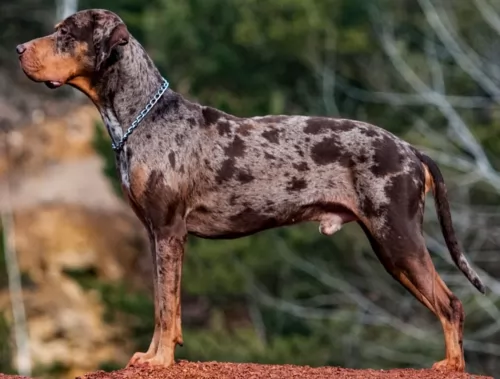 Catahoula dogs are the kind of dogs that make perfect family pets as they are all rounders. They’ve got characteristics that everybody wants in a dog. They are naturally protective, even they are not described as aggressive dogs. With training and socialization they get on well with children as well as other pets in the home. He is alert and territorial, which makes him a good watchdog, more so because he doesn’t particularly like strangers.
Catahoula dogs are the kind of dogs that make perfect family pets as they are all rounders. They’ve got characteristics that everybody wants in a dog. They are naturally protective, even they are not described as aggressive dogs. With training and socialization they get on well with children as well as other pets in the home. He is alert and territorial, which makes him a good watchdog, more so because he doesn’t particularly like strangers.
Intelligent and independent, training makes him wonderfully obedient and relaxed. However, give him the chance for ball games and a walk, and he is more than ready.
He is used to being a guard- and hunting dog, and this makes him an active, energetic dog. You will need to give him plenty of activities if you don’t want this amicable dog becoming anxious, frustrated and destructive.
Exercise him well, provide him with nourishing, top quality food together with fresh water and shower him with the love and attention he deserves as a family member. You’ll also join the ranks of Catahoula Cur owners who want to tell others about what an awesome pet he makes.
 The Alopekis is an endangered species of canine due to a variety of factors. Traditionally this has been a healthy gene pool and the breed has been an example of the evolution of small canines. Factors such as farm pesticides, urbanization and cross breeding have affected the breed’s future.
The Alopekis is an endangered species of canine due to a variety of factors. Traditionally this has been a healthy gene pool and the breed has been an example of the evolution of small canines. Factors such as farm pesticides, urbanization and cross breeding have affected the breed’s future.
This is made worse by the fact that the female Alopekis only breeds once a year, the litters are small, and the puppy mortality is high. In addition, the dogs are regularly neutered as part of a program to control strays, despite their status as an endangered species.
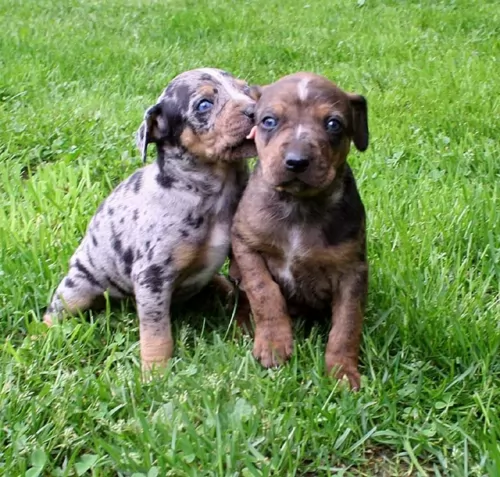 When you buy a Catahoula Cur, you can know that your pet is going to be fairly healthy, however there will be some common health issues to look out for, and by knowing about these health concerns, you can be better prepared.
When you buy a Catahoula Cur, you can know that your pet is going to be fairly healthy, however there will be some common health issues to look out for, and by knowing about these health concerns, you can be better prepared.
Your Catahoula Cur will be susceptible to some bacterial and viral infections which can be life threatening for him if he gets them. Some of these are parvo, distemper and rabies. That is why it is important to have your pet vaccinated, which can start at about 8 weeks of age for a puppy.
Obesity is a world-wide problem with humans and with their pets and it can open up a whole lot of problems with your pet’s health that he otherwise might not have got. It can play havoc with your pet’s digestion, and it can cause joint problems too.
It can be so tempting to pop a sweet treat into your pet’s mouth because you love him so much, but get to know what foods can actually be hazardous for him.
 This is a high energy dog and the puppies need to be fed a high-quality puppy food. Feed about 1/3 of a cup twice a day.
This is a high energy dog and the puppies need to be fed a high-quality puppy food. Feed about 1/3 of a cup twice a day.
Feed high- quality dry dog food and dog treats to this active dog. Feed about ¼ of a cup twice a day – more if below average weight and less if overweight.
Keep them active and away from pesticides if possible.
This is a very active dog that needs a lot of exercise, games and if possible – a job.
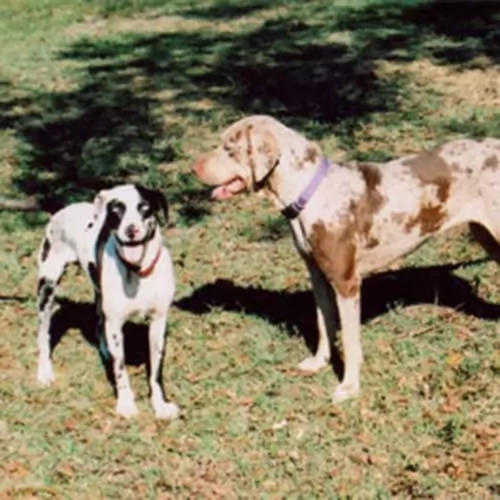 Your Catahoula Cur isn’t a high maintenance dog and a good brushing 2 times a week will keep his leopard coat looking shiny and free of loose hairs.
Your Catahoula Cur isn’t a high maintenance dog and a good brushing 2 times a week will keep his leopard coat looking shiny and free of loose hairs.
Catahoula’s have good teeth, and you want to keep them that way by brushing them at least 2 or 3 times a week to prevent dental decay and a host of other medical issues.